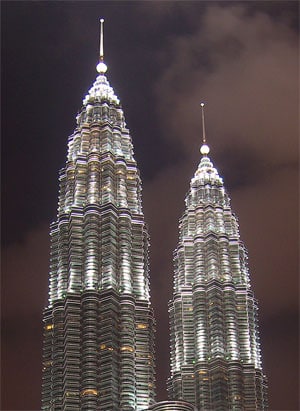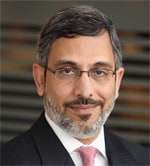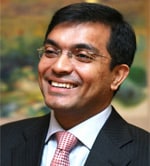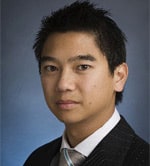CROSSING ASIA’S FRONTIERS
By Michael Shari
As banks and regional hubs throw their weight behind Islamic finance, shariah-compliant products are crossing not just national borders but also product lines in Asia.
 |
| Photo Credits: MANZRUSSAL I / Shutterstock.com |
There’s nothing out of the ordinary about Khazanah Nasional Berhad, the government investment corporation of Malaysia, a predominantly Muslim Southeast Asian nation, issuing a sukuk (a shariah-compliant bond). But when Khazanah chose the Far East financial center of Hong Kong as the market to issue a sukuk and also chose to denominate it in renminbi, the currency of mainland China, market watchers raised their collective eyebrows. And when the issue was 3.4 times oversubscribed and priced at the high end, raising the equivalent of $357.8 million, the significance was lost on no one.
“We have certainly seen the expanding of frontiers in Islamic finance and the development of new product areas in Islamic finance, including in Asia,” says Gregory Man, a lawyer with Clifford Chance who specializes in Islamic finance. “Deals are becoming more and more complex in terms of the structures that have been utilized, and we have also seen new participants coming to the market.”
This year Islamic finance has been expanding across Asia with a ferocity previously unseen in the normally staid realm of shariah-compliant banking. It has leapt not only the continent’s national borders but product lines as well. From Islamabad to Tokyo, global banks, insurance companies and international law firms are testing the limits of new blueprints for the issuance of shariah-compliant products that they have carefully crafted with national regulators and committees of Islamic scholars. And they are raising capital for Islamic corporate clients not just in fixed income but across the entire spectrum of investment banking services from initial public offerings to mergers and acquisitions. They are also breaking boundaries with a wide variety of new shariah-compliant insurance products, known as takaful. These insurance products are essential not just for investment banking but also for trade finance in critical elements of Asia’s real economy, such as shipping, construction and manufacturing.
“Eventually, the pension holders will want their money to be invested in a shariah-compliant manner and will participate in the sukuk market also”
– Afaq Khan, Standard Chartered Saadiq
This expansion is being driven by insatiable demand among Asia’s Muslims, who make up 60% of the Muslim population worldwide and have historically kept much of their savings under the mattress. They’re only just now discovering ways of investing their money that are not in violation of Islamic teachings forbidding practices that can be considered exploitative, such as the collection of interest or the transfer of risk from one party to another. And they’re getting a helping hand from corporations that are not run by Muslims but are eager to do business with Muslims. In a telling example of this trend, Daniel Cookson, a senior associate at Clifford Chance who specializes in Islamic finance in Singapore, was recently told by a shipping executive in the city-state that he was just as willing to use Islamic financing structures for shipping leases as conventional ones if it meant opening up new markets.
STIMULATING DEMAND
 |
|
Khan, Standard Chartered Saadiq: Pension funds in Muslim countries are starting to allocate to some local Islamic banks |
Until recently, Islamic finance was mainly a domestic business. Every predominantly Muslim country has its own committees of Islamic scholars who decide if financial instruments are shariah-compliant or not, and they rarely agree with each other. But that started to change with the development of standardized documentation by the International Swaps and Derivatives Association and the International Islamic Financial Market for cross-border interest rate swaps and currency swaps in early 2010. The process took a quantum leap forward in April this year, when the government of Hong Kong announced a two-month consultation on proposed changes to the Asian financial center’s tax regime to promote the development of an Islamic bond market in Hong Kong that would be based on the year-old documentation.
As Islamic finance crosses frontiers, it is finally accumulating the economies of scale that global banks can start to work with. Global Islamic banking assets are expected to exceed $1.1 trillion this year—almost 15% of those assets reside in Southeast Asia—after growing by about 20% a year for the past five years. The sukuk market alone has grown from $33 billion in 2006 to $180 billion at year-end 2011, 66% of which originated from Asia, according to the Malaysian central bank.
 |
|
Hayat, CFA Institute: Singapore and Hong Kong are building up the same capability in Islamic banking that they established for conventional banking |
Sukuk is also stimulating demand for Islamic insurance products. “If you offer a sukuk Islamic bond or an Islamic REIT, in principle the underlying assets should be covered on a takaful basis. So there are incentives for corporate clients to have takaful coverage,” explains Marcel Papp, head of retakaful—or Islamic reinsurance—at Swiss Re Retakaful, the Islamic reinsurance arm of Swiss Re in Kuala Lumpur.
Global financial institutions are sweeping Asia’s financial centers straight into the eye of the new Islamic financial storm. Hong Kong, Singapore and Taiwan are built on islands that have small populations and few Muslims. But Singapore already has some of the most advanced Islamic banking regulations in Asia. Hong Kong is in the process of writing its own set of regulations, and Taiwan earlier this year invited a team of international bankers to brief its regulators on shariah-compliant financial instruments. Even Japan changed its tax laws last November to encourage Islamic banking in the country. Asia’s most vibrant banking centers are at different stages of building a regulatory environment to support banks and insurance companies that are already deeply involved in creating the economies of scale they require to make Islamic finance worth their while.
ISLAMIC REGIONAL HUBS
 |
|
Ghani, CIMB Islamic: The primary hub for takaful may well shift from the Gulf Cooperation Council to Southeast Asia |
Just as these financial hubs built their eonomies into three of Asia’s famed “Tiger” emerging economies in the 1990s as entrepôts for trade and banking across the region, they are now trying to establish themselves as hubs for Islamic finance while it’s still early enough in the game. They have their eye on the pension funds of large, predominantly Muslim countries in the region like Indonesia, Malaysia, Bangladesh and Pakistan.
“Pension funds in predominantly Muslim countries are starting to allocate to some local Islamic banks in equity. Eventually, the pension holders will want their money to be invested in a shariah-compliant manner and will participate in the sukuk market also,” says Afaq Khan, CEO of Standard Chartered Saadiq, the international Islamic banking business of Standard Chartered.
Singapore and Hong Kong are building up the same capability in Islamic banking that they established as regional hubs for conventional banking. They are employing 21st-century trading technology, the best financial regulatory regimes in Asia outside of Japan, and a local supply of well-trained financial professionals to manage Asian pension assets for the regional headquarters of global banks, explains Usman Hayat, director for Islamic finance at the CFA Institute in London.
But Hong Kong and Taiwan have their eye on a different target market. Twenty million (1.5%) of China’s 3.4 billion population are Muslims, which was apparently large enough for Cheng Guoping, vice foreign minister of China, to tell Ekmeleddin Ihsanolu, secretary general of the Organization of Islamic Cooperation, in June that Beijing would seek observer status in the organization.
 |
|
Man, Clifford Chance: Deals are becoming more and more complex in terms of the structures that have been utilized |
When it comes to insurance products, Southeast Asia appears to show the most promise for takaful products, which have not been accepted by scholars in Saudi Arabia and thus have not internationalized as fast as Islamic banking. Indonesia is emerging as a significant takaful market, overtaking several of the Gulf Cooperation Council countries in terms of gross written contributions. Together with Malaysia and Brunei, Southeast Asia accounts for $2 billion in GWC. The average contributions per operator in Southeast Asia grew by 24% in 2010 to $141 million last year, according to Malaysia’s central bank.
“With Saudi regulators disallowing the pure takaful model, we believe the primary hub for takaful may well shift from the Gulf Cooperation Council to Southeast Asia,” says Badlisyah Abdul Ghani, CEO of CIMB Islamic, a unit of Malaysian bank CIMB Group Holdings.
Bankers agree that it will take time for Asia’s regulators to fully adopt Islamic finance. It will also take time for banks to learn how to make shariah-compliant products as profitable as conventional ones. Even a decade after these products were first introduced in Asia by Malaysian banks, bankers admit that Islamic financial services still cost more to operate. But bankers say they expect costs to normalize as economies of scale build up.
The next step is to link Asia’s Islamic financial markets with those of the Middle East, North Africa and elsewhere—as Islamic investors seek to diversify their exposure and regulators adapt to that demand. “If a Middle Eastern client wants to transact in China, that can be done in a shariah-compliant manner. If a Chinese client wants to transact in the Middle East, that can also be done,” says Khan. Ultimately, innovation in Asia will be credited with driving the global Islamic finance market.
THE CURIOUS CASE OF PAKISTAN
One of the great ironies of Islamic finance development is that the toughest market in Asia for Islamic finance to crack could very well turn out to be the very same country that many Islamic finance experts regard as the spiritual birthplace of modern shariah-compliant banking.
According to the CFA Institute’s director of Islamic Finance, Usman Hayat, it all began with a speech that Muhammad Ali Jinnah, the founder of Pakistan, delivered at the opening ceremony of the State Bank of Pakistan’s central bank in July 1948. Jinnah was the first speaker on record to use phrases that still appear today in marketing material for shariah-compliant products on the equal treatment of all counterparties to a transaction and criticizing the conventional financial system.
Yet Islamic finance has made less progress in Pakistan than in most predominantly Muslim countries. Even though 95% of Pakistan’s 190 million people are Muslims, only 5% of the country’s assets are shariah-compliant. The penetration rate is so low that it casts doubt over the “like-for-like” argument, according to which most Islamic investors can be expected to prefer shariah-compliant investments over conventional ones as long as the risk-return propositions are roughly the same, Hayat explains.
Still, Islamic finance is growing faster than conventional finance in the South Asian nation, though from a small base. In 2010, Islamic financial assets in Pakistan grew at a consolidated annual growth rate of 82%, while conventional assets grew by only 14%.



